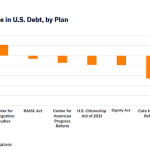
It may be years before we fully realize the ramifications of the lockdown policies governments around the world have imposed on their citizens in response to covid-19, but evidence of the costs is starting to trickle in.
A recent study conducted by the Centers for Disease Control and Prevention (CDC) surveyed thousands of high school students on the effects of the pandemic. “Since the beginning of the pandemic,” the study reports, “more than half of students found it more difficult to complete their schoolwork (66%) and experienced emotional abuse by a parent or other adult in their home (55%),” which correlated heavily with students who “experienced insecurity via parental job loss (29%), personal job loss (22%), and hunger (24%).”
A related CDC study, released the same day, examined the effects the pandemic has had on the mental health of high school students. It found that “during the 12 months before the survey, 44.2% experienced persistent feelings of sadness or hopelessness, 19.9% had seriously considered attempting suicide, and 9.0% had attempted suicide.”
These findings should be no surprise. Only a few months into the pandemic, the CDC’s morbidity and mortality report surveyed people of all ages regarding substance abuse and suicidal thoughts, and young people showed the most dramatic increase compared with precovid surveys. This report was all but ignored, of course, as the demagogues in politics and the media predicted Armageddon if the world didn’t embrace their draconian isolation policies.
Now that the Chicken Littles have come home to roost, the real question is whether the findings of these studies are the consequence of the pandemic or the response to it. One CDC representative, speaking of the studies, provided a revealing answer to this question: “This really gives us the evidence to say with certainty that the pandemic was incredibly disruptive for young people and their families” (emphasis added). The “pandemic took a toll,” according to every media headline reporting on the studies.
To some, the distinction between the pandemic and the lockdowns may seem like splitting hairs, but the choice of words can have important consequences on present and future policies. The logic behind the social-distancing mandates has been that such policies are necessary to lessen the severity of the pandemic. Even in the face of overwhelming evidence that the lockdowns have proven ineffective, the faithful will always find ways to dismiss the naysayers and urge even more severe mandates (the problem is that we haven’t isolated enough!).
If, as the media and researchers claim, it is the pandemic taking such a toll on young people, then it seems to justify even more authoritarian responses to the virus. Lock down harder! Isolate further! Punish violators more severely! The lockdowners, like Mrs. Lovejoy, need only cry “think of the children” and the effects the pandemic is having on them to drive support for the very policies that, in reality, are responsible for the problems they aim to solve.
This is why it is so crucial to properly link cause and consequence. It is not, and has never been, the pandemic that has been creating financial insecurities for families and destroying the social lives of our youth. It is not the pandemic that is increasing the rates of depression, drug abuse, and suicidal thoughts among teenagers (and adults, even if not as severely). These are the costs of the policy responses to the pandemic that have, in the name of keeping us safe, told vulnerable young people that they cannot see their friends, show their faces, or engage in any of the social activities that help them develop into mentally healthy adults.
It is time for the media to start reporting that it is the lockdowns, the isolationism, and the social-distancing mandates—not the pandemic—that have taken such a toll on teenagers.





